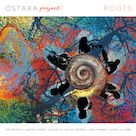

Ostara Project: Roots
Rhea Records
Calling Ostara Project Canada's all-female supergroup is neither excessive nor unwarranted. After all, its six members bring to the table two Juno awards, three Western Canadian music awards, a Grammy nomination, and no less than sixteen Juno nominations. As importantly, the sextet boasts musicians who are among the country's best, be it saxophonist Allison Au, trumpeter Rachel Therrien, or pianist Amanda Tosoff. They, along with fellow Ostara members vocalist Shruti Ramani, bassist Jodi Proznick, and drummer Valérie Lacombe, are sought-after players, soloists, and bandleaders in their own right but who also recognize the unlimited potential a collective project affords. While the group is very much a democratic entity that gives voice to each member, Ostara Project is spearheaded by Proznick and Tosoff, who co-produced Roots, recorded in March 2024 at Vancouver's Warehouse Studios.
As intimated by the album title, the release pays tribute to its members' cultural and familial ancestry, and the diversity of the material reflects the vast range of backgrounds the group members draw upon. Whereas Tosoff, for example, references Bulgarian folk music in her composition, Proznick's arrangement of a beloved folk tune was inspired by her Ukrainian heritage. The two settings by Therrien are homages to Quebecois family members, while Ramani's celebrates her Mumbai-living Hindustani grandmother. Holding together such extremely diverse musical expressions is the thematic concept shared by the seven pieces.
Tosoff's “Dreams and Olive Trees” sets a high bar, especially when its mid-tempo swing's buoyed by an entrancing folk theme. Elevating its celebratory tone further are Ramani's wordless vocalizing and the one-two punch of Therrien's trumpet and Au's saxophone. While much of the song's through-composed, room is made for a sparkling piano solo from its author, and Proznick and Lacombe power the tight performance with authority. Au's “2601" pays tribute to her Jewish grandfather by titling the ballad after the number etched onto his arm at Auschwitz. Sensitively rendered and with Tosoff on electric piano, the piece unfolds as a heartfelt homage that elicits from Au a characteristically incisive solo that's complemented by an explorative one from Therrien.
Its title might call to mind the standard “What a Little Moonlight Can Do,” but the florid folk expression that opens “What A Moonlit Night” shows it to be a different animal altogether. Arranged by Proznick, the tune swings with Ukrainian flavours seeping into its driving groove. At four minutes, it's a compact performance, yet the group nevertheless manages to turn much of it into a hard-swinging expression. Ramani's agile vocal runs lend “Rajalakshmi” much of its character, but ample space is allocated to the others' contributions when Au's soprano sax adds a serpentine element and Therrien's adventurous horn blusters like the stormiest of breezes.
After Therrien pays loving tribute to her late father, a Quebecois sea captain, with the lyrical “Papa,” the music relocates to a freewheeling improv zone for “Voyage Sans Retour” and its incorporation of a French text written by her Quebecois poet grandfather, Charles. The set concludes dynamically with Lacombe's hard-bop throwdown “Raven Haven,” which the drummer titled after the ravens of Whitehorse. The six burn through the album-capper with aplomb, the material serving as an excellent springboard for exuberant soloing from all involved.
If there's a downside here, it has to do with cohesiveness. There are times when the contrasts from one track to another are so pronounced, Roots could pass for recordings by entirely separate units, and a clear group identity gets muddied in the process. While it could be argued that such contrasts testify to the values of multiplicity and diversity the group supports, such shifts in identity can be jarring. Such versatility has an upside, however: one would rather be presented with an ensemble where the sky's the limit, stylistically speaking, than one that's too locked into a single style. There's nothing, it would seem, Ostara Project is musically incapable of tackling, and further evidence of that will likely present itself when the group's related follow-up to Roots, Wings, is released later this year.April 2025